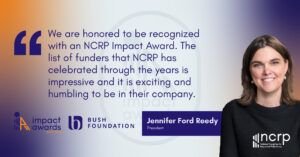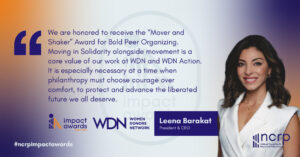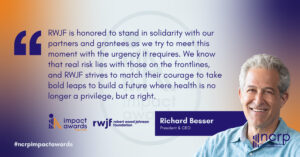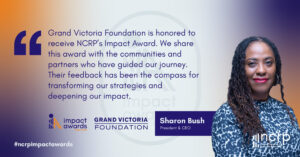NCRP launches the second phase of our Climate Justice and Just Transition campaign: holding climate funders accountable for their continued underfunding of these necessary frontline organizations with this special 2-part blog. Look out for part 2, where NCRP will dig further into CWF’s grantmaking data, including the increase in overlapped funding for non-frontline organizations between ClimateWorks and their funders. NCRP will also look more closely at the ClimateWorks ecosystem and other programs within the organization that amplify their influence in this field.
For years, billionaires and multimillionaires have privatized government services, lionized their wealth, and told us that the charity they direct – not the solidarity and organizing that movements lead – will solve the biggest systemic issues of our time.
We are living through the dire consequences of putting wealth on a pedestal at the expense of working-class Black, brown and Indigenous communities, who are forced to fight for pennies to resource their work. Despite having proven solutions, frontline, grassroots organizations are stretching themselves thin to move projects forward while also fighting back against dangerous opposition. They should not have to choose.
Today, with that in mind, NCRP launches the second phase of our Climate Justice and Just Transition campaign: holding climate funders accountable for their continued underfunding of these necessary frontline organizations. We’re doing so by spotlighting ClimateWorks Foundation (CWF), a prominent intermediary and influential force in the climate funding ecosystem.
At a time when the federal government is attacking nonprofits focused on climate and equity, NCRP stands with both funders and grantees in the crosshairs. But at moments like these, it is even more important that ClimateWorks stand in greater solidarity with frontline groups and share in the risk that communities on the ground face on a much deeper level.
And, while moving more money to the frontlines is NCRP’s ultimate goal, we also want to focus on who and what influences funders to continually under-resource these communities in the first place. Without shifting the power imbalance behind funding decisions, the act of moving the money becomes surface level lip service instead of a cultural change that transforms the way philanthropy operates.
In this opening part one of a two-part series, NCRP will explore the ClimateWorks Foundation (CWF) leadership and governance, pointing out the gaps in what CWF considers to be expertise in the climate funding space. In part two, NCRP will examine the echo chamber in CWF’s grantmaking, including both the overall lack of frontline representation among its grantees and the overlap of grant recipients between CWF and its own funders. Both pieces will include a call for CWF and its funders to better center and resource the frontlines and influence others to do the same.
*We want to note that on the data, NCRP would welcome additional information to clarify this picture further, but to date ClimateWorks has not shared additional information about their grantmaking, or programmatic work publicly. Also, as of publication, many pages about their justice and equity work have been removed from their website.
Challenging the Power of Billionaire Philanthropists
In 2023, NCRP pointed out the problem of The Filthy Five: five billionaires – Jeff Bezos, Michael Bloomberg, Bill Gates, Mark Zuckerberg, and John Doerr – who positioned themselves as climate “experts.” Their main credential? The obscene amounts of wealth they made, in part, off the backs of those who they purport to support through their philanthropic efforts.
Since then, the influence of billionaires in our society has become even more prevalent. Climate tech billionaire (and outright white supremacist) Elon Musk, for example, has bulldozed his way through the government as if it were Twitter (X) headquarters. Amid this extremely illegal and devastating misappropriation of government power, more and more wealth holders are falling in line. Mark Zuckerberg and Jeff Bezos’ philanthropic entities have both cut ties with essential grantees and programs to align with the current presidential administration. Bill Gates, who also claims to care about the climate crisis, is cutting staff and funding from his Climate Tech Fund: Breakthrough Energy. Other billionaires have continued to stay silent, preferring to maintain their wealth instead of mobilizing the resources necessary to support those most impacted.
This is not surprising, because wealth does not equal expertise. Philanthropy as it exists today often does not serve, and in some cases actively harms communities and groups on the frontlines of multiple systemic injustices, including the climate crisis. It is easy to be angry at billionaires and how they use their enormous amounts of wealth, including the ways they use philanthropy to boost their public reputations. But many institutional funders also have difficulty recognizing how their own choices play into the same pattern.
Over the past two years, NCRP has found that billionaires and institutional philanthropy engage in similar practices. This includes:
- Hoarding wealth, using a 5% payout rate from their endowment as the ceiling instead of the floor
- A tendency to fund or provide big pledges where the money often does not reach the groups on the ground that it purports to.
- Holding back resources on technicalities instead of shifting behavior and practice to be movement informed.
- Making frontline groups jump through hoops to receive minimal amounts of money compared to legacy organizations, think tanks and academia.
It is past time to be bold and hold climate philanthropy accountable for their role in underfunding the groups that have proven solutions, especially now.
Spotlighting ClimateWorks Foundation
CWF is a powerful and influential institution that has successfully positioned itself as the center of gravity in the climate funding ecosystem. To quote CWF from their most recent IRS 990:
“ClimateWorks Foundation’s mission is to end the climate crisis by amplifying the power of philanthropy. We are a global platform for philanthropy to innovate, collaborate, and accelerate climate solutions that scale by bringing together a unique network of grantmakers, grantees, researchers, and other implementing partners. We provide a suite of programs and services uniquely designed to amplify the power of a climate philanthropy community that is larger, more coordinated, more international, and growing faster than ever. Through our programs and services, ClimateWorks helps the field of climate philanthropy act with the ambition, urgency, capabilities, and interconnections needed to end the climate crisis”
As a funder intermediary, CWF both regrants funding from mostly institutional foundations, guides strategy at the tables it convenes, and disseminates research and data on climate funding topics and trends. With this profound positional power in the climate ecosystem comes a responsibility to center those who will be most impacted by the climate crisis and resource their work.
However, by their own measure, only 19 (or 2.6%) of CWF’s 728 grants and contracts in 2023 were considered “JEDI (justice, diversity, equity and inclusion) grants.” In the nearly two decades since ClimateWorks’ founding, the climate crisis has only gotten more dire with its effects on frontline communities only increasing. 2.6% is not progress; it is deliberate under-resourcing masquerading as such.
To be clear, the climate funding ecosystem as a whole shares this problem. ClimateWorks did not create this dynamic by themselves, and they are not alone in perpetuating it. But CWF’s unique influence in the climate funding ecosystem means that they have a duty – and incredible opportunity – to embrace a different path.
One obstacle to change is CWF’s current leadership composition. As part of our analysis, NCRP examined who within CWF is positioned to make major grant and programmatic decisions and where their knowledge and expertise comes from.
Below is a qualitative data set of 49 past and present board members and executive leaders of the organization sourced from 990 tax forms and CWF’s website.
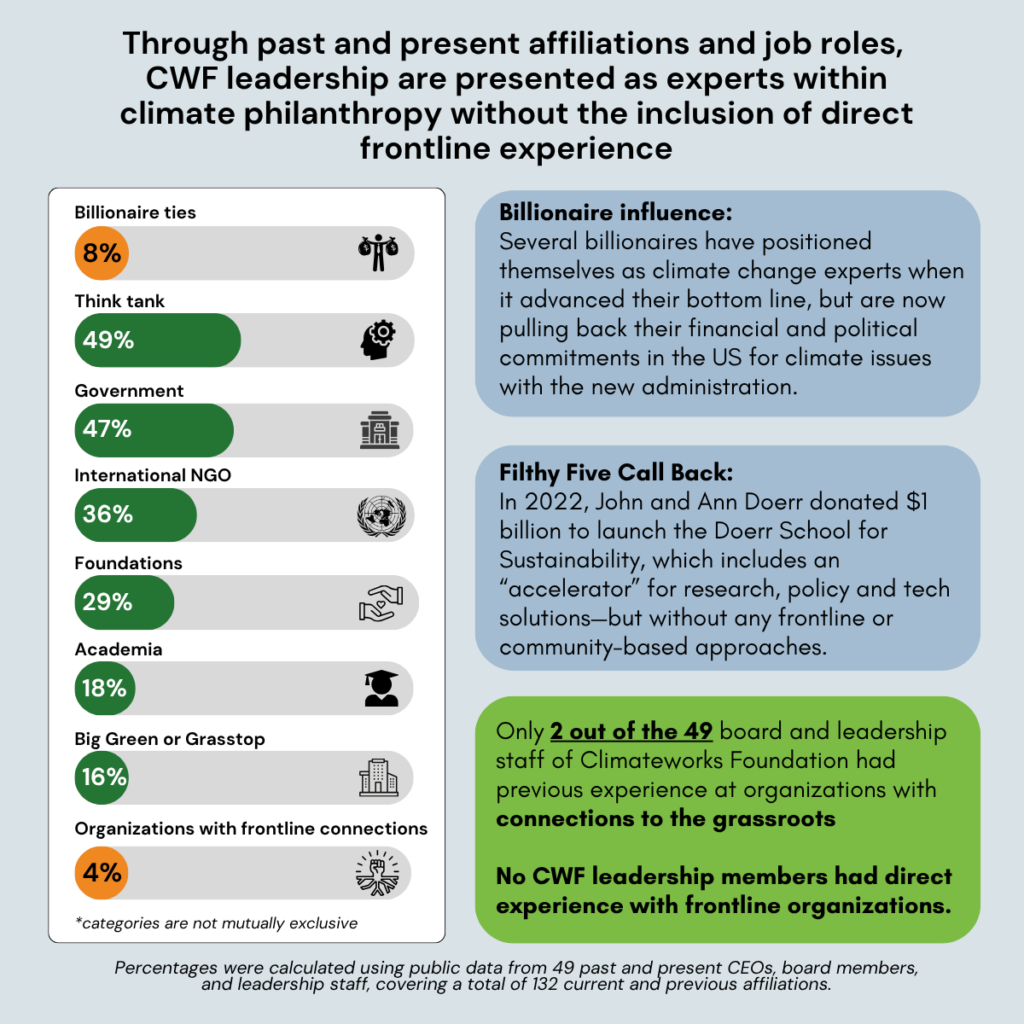
Public information reveals that CWF leadership has ties to several influential institutions but lacks frontline, grassroots experience. Only 4% of board members and executive leadership combined have worked at organizations that have frontline connections. None have worked at organizations that are frontline led. Instead, the most common affiliations are with think tanks, various government departments and administrative committees, and international governance institutions like the UN or the World Bank. Positions like these represent roles of significant influence, where decisions can shape policy and impact global and national outcomes for climate initiatives. These affiliations are not inherently problematic. But when climate funding decisions are not accompanied by the input of frontline communities with lived experiences critical for a just transition to a regenerative economy, the funding becomes limited and uneven. If there is no one within CWF’s leadership who comes from frontline movement work, how can they adequately support those organizations and communities? What does that mean for those who need funding the most?
Shift the Influence, Shift the Resources
Local, grassroots and frontline place-based climate and environmental justice groups are often the first responders on the ground to climate and environmental injustice happening in their communities. They are also the most vulnerable to attacks and impacts from funding rollbacks. The need for rapid response and calls for legal and security support to help stem the tide of immediate threats will only grow. But for true stability, long-term, transformative support will be crucial, and that must start now.
NCRP calls on ClimateWorks Foundation to live into the deepest potential of its role as a “global climate philanthropy platform” by centering the needs of those who have always been most impacted by the climate crisis.
This will be much easier if its leadership reflects and honors those doing the work on the ground, rather than over-emphasizing a narrow, conventional definition of expertise. That ranges from who sits on CWF’s board and advisory bodies to who is invited to seats of power at their Funder Table.
ClimateWorks Foundation not only has the power to improve their grantmaking, but also the influence to shift other funders to do the same. It is time for them to utilize their resources to amplify and support the communities with proven solutions, directly.
In part two of this blog, NCRP will dig further into CWF’s grantmaking data, including the increase in overlapped funding for non-frontline organizations between ClimateWorks and their funders. NCRP will also look more closely at the ClimateWorks ecosystem and other programs within the organization that amplify their influence in this field.

